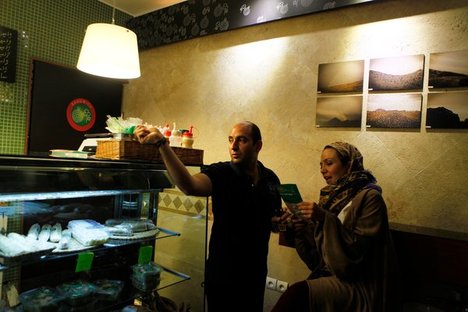 “Ali Mesgaran and a friend at the sandwich shop he opened this year in Tehran. He said his shop was one place where he controlled his destiny.” Source of caption and photo: online version of the NYT article quoted and cited below.
“Ali Mesgaran and a friend at the sandwich shop he opened this year in Tehran. He said his shop was one place where he controlled his destiny.” Source of caption and photo: online version of the NYT article quoted and cited below.
(p. A4) TEHRAN — About two months ago, when many Iranian families were stocking up on rice and meat to prepare for seemingly inevitable military conflict with the West over Iran’s nuclear program, Ali Mesgaran, 35, decided to open a sandwich shop.
Iran’s national currency, the rial, had just lost nearly half of its value amid new international sanctions, and banks and exchange offices were spilling over with orders for gold and foreign currency from people hoping to protect family savings from soaring inflation.
“There are always problems in this country,” Mr. Mesgaran said, explaining why he decided to open his shop, Piyaz Jafari, named after a traditional Iranian sandwich spread of onions and herbs. “We felt that if we ever wanted to be successful, we just had to ignore those.”
. . .
The widespread sense of hopelessness is reinforced by memories of the presidency of Mohammad Khatami, Mr. Ahmadinejad’s predecessor, who was in power from 1997 to 2005. During his two terms, he tried to promote personal freedom, to encourage better relations with the West and to relax suffocating dress codes, drawing anger from conservatives but attracting millions of votes from youths and women.
. . .
(p. A12) On a recent day at Mr. Mesgaran’s sandwich shop, the talk was not about politics, but about the odd torrential rains that in recent weeks had flooded even parts of the city’s subway system. “This is my world,” he said, gesturing at his shop and his customers. “At least here I am in control of my destiny. That is a good feeling.”
For the full story, see:
THOMAS ERDBRINK. “TEHRAN JOURNAL; Pinched Aspirations of Iran’s Young Multitudes.” The New York Times (Tues., May 8, 2012): A4 & A12.
(Note: ellipses added.)
(Note: the online version of the article has the date May 7, 2012.)

